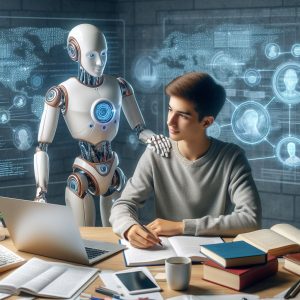AI-Powered Transformations in Cinema: From Script to Screen
The cinema industry is on the cusp of a revolution, driven by the ever-evolving capabilities of artificial intelligence (AI). From scriptwriting to post-production, AI is poised to reshape the filmmaking process, unlocking new creative possibilities and transforming the way we experience movies. Here are some exciting ways AI could impact the cinema industry:
1. Storytelling and Scriptwriting:
- AI-powered story generators: Imagine AI helping screenwriters overcome writer’s block or generating fresh story ideas based on specific themes or genres. Tools like ScriptBook and LaMDA are already making waves in this area.
- Character development and dialogue: AI can analyze existing narratives and character archetypes to create compelling new characters and generate realistic dialogue that reflects their personalities and motivations.
- Predictive analysis: AI can analyze audience preferences and box office trends to suggest story elements or genres that are likely to resonate with viewers, aiding in the pre-production decision-making process.
2. Production and Filming:
- Virtual sets and location scouting: AI-powered virtual sets can create realistic and dynamic environments, reducing the need for physical sets and location scouting. This can save time and money, while also opening up possibilities for fantastical or impossible locations.
- Real-time visual effects and compositing: AI can automate tedious VFX tasks like green screen removal and object tracking, allowing filmmakers to achieve complex visual effects in real-time on set. This can streamline the filmmaking process and enable more flexibility during shooting.
- Cinematography and shot composition: AI-powered cinematography tools can suggest camera angles, lens choices, and shot compositions based on the desired mood and tone of the scene. This can assist filmmakers in achieving their creative vision and telling the story visually.
3. Post-production and Editing:
- Automated editing and scene assembly: AI can analyze footage and automatically assemble rough cuts based on pre-defined parameters, saving editors time and allowing them to focus on the finer details.
- Music composition and sound design: AI can generate original music and sound effects that adapt to the mood and pace of the scene, enhancing the emotional impact of the film.
- Color grading and visual enhancements: AI can automate color grading processes and suggest adjustments to improve the overall look and feel of the film.
4. Personalized movie experiences:
- Interactive storytelling: AI could enable interactive movie experiences where viewers can make choices that influence the narrative, creating a more personalized and engaging experience.
- Adaptive content: AI could tailor the film’s audio, visuals, and even story elements based on the viewer’s preferences and demographics, creating a unique experience for each individual.

5. Predictive Analytics for Box Office Success:
AI algorithms are being employed to predict the potential success of a film at the box office. By analyzing historical data, audience preferences, and market trends, these algorithms can provide valuable insights into the commercial viability of a movie. Studios can use this information to make data-informed decisions about budgets, marketing strategies, and release dates.
6. Filmmaking with AI Drones and Robotics:
AI-powered drones and robotics have revolutionized cinematography, offering filmmakers unprecedented flexibility and creativity in capturing scenes. These devices can autonomously navigate through complex environments, follow pre-programmed flight paths, and even adjust camera angles in real-time. The result is breathtaking aerial shots and dynamic camera movements that were once challenging or impossible to achieve.
7. Enhanced Audience Engagement:
AI is not limited to the creative aspects of filmmaking; it also plays a role in audience engagement. From personalized movie recommendations based on viewing history to interactive AI-driven experiences during film premieres, technology is creating new avenues for audiences to connect with the cinematic world.
8. Democratization of filmmaking:
- AI-powered tools can make filmmaking more accessible and affordable for independent creators and smaller studios. Tools like RunwayML and Adobe Sensei are already providing AI-powered editing and VFX capabilities that were previously out of reach for many filmmakers.
It’s important to remember that AI is not a replacement for human creativity. Instead, it should be seen as a powerful tool that can augment and empower filmmakers, allowing them to focus on the core aspects of storytelling while automating tedious tasks and opening up new creative possibilities. As AI technology continues to evolve, we can expect even more transformative applications in the cinema industry, leading to a new era of immersive and personalized storytelling experiences.


